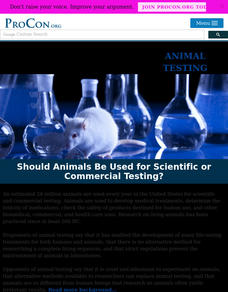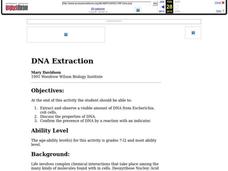Chicago Botanic Garden
Calculating Your Ecological Footprint
You can lower your ecological footprint by recycling! Lesson four in this series of five has individuals, through the use of a computer, calculate their ecological footprints. Through discussions and analysis they determine how many...
ARKive
Biodiversity and Evolution
Why is diversity in biology so important for an ecosystem? Explore biodiversity, evolution, and natural selection with a presentation for your biology class. It features clear information, activities for further understanding, and...
Cold Spring Harbor Laboratory
Some DNA Does Not Encode Protein
Roy John Britten easily earned a PhD in nuclear physics—but he found painting with water colors too difficult. Young scientists learn about Britten's life, career, and research with an online interactive. They read a biography, view...
American Museum of Natural History
Around the World with DNA
DNA analysis could be what saves some animals from extinction. An interactive lesson shows learners how DNA information proves variation among animals of the same species and how stakeholders use that information to make decisions. Easy...
Curated OER
Managing Wildlife
Students discuss the current conditions of wildlife in New England. Students explore how animals are tracked and how their population is managed.
Curated OER
Cures: Barometer
Students discuss and fill out a worksheet about the controversial cures of people with disabilities in the past. In this disabilities lesson plan, students write about the issues and justification for if they agree or disagree with these...
Biology Junction
Cellular Division
Based on current scientific knowledge, all cells come from preexisting cells. Scholars learn about cell division, cell replication, mitosis, meiosis, and more with a PowerPoint. It describes the differences between prokaryotes and...
Curated OER
Animal Testing
Animal testing: cruel and inhumane, or innovative and life-saving? Scholars explore the topic and form their own opinions with help from the highly informative website. Pupils read a comprehensive overview of the topic, including...
Curated OER
Spring
Students examine lichens in an outside field trip. Students explore the diversity of this organism and ask questions about them.
Curated OER
Biodiversity Activity
Students are introduced to biodiversiy. They use a simulation of two forests, one planted with only Douglas Fir trees, and one with diverse species of trees. Students also use the simulation of two forests, one a monoculture of only one...
Curated OER
Regulation of Cell Division
Cell division and all the biological aspects of activation and chemical signals are detailed here. Cyclin, G phases, cell growth, and cancer checkpoint control systems are explained and the triggers listed. The slides are very clear and...
WK Kellogg Biological Station
Sounds of Selection
Do you want a creative and fun way to teach about natural selection? Hop to it by turning your middle school princes and princesses into frogs trying to catch as many bugs as possible in a Hungry Hungry Hippos style game. For high...
American Society for Microbiology
”Build a Bacterium” Scavenger Hunt
An exciting activity has scholars use cell parts to build bacteria through cooperation with other groups. Each group has some of the cell parts needed, but they must trade with other groups to be able to fulfill their function as a...
Howard Hughes Medical Institute
Viral DNA Integration
How do viruses hijack our cells to produce more viral particles? Junior immunologists model how viral RNA integrates into a host cell's DNA using pop beads and use interactive tools to explore a virus' genome. The teacher's guide...
National Nanotechnology Infrastructure Network
Help or Hype: The Ethics of Bio-Nanotechnology
Ethical concerns are not always black and white. A well-designed lesson plan presents learners with scenarios for which ethics may come into question. Scholars learn to consider the different sides of a situation and make an...
Serendip
Cell Differentiation and Epigenetics
Pregnant women exposed to PAH air pollution increase the risk of obesity in their children. The example of epigenetics, along with others, builds the basis for understanding the process of cell differentiation. Scholars view a video,...
Serendip
Using Molecular and Evolutionary Biology to Understand HIV/AIDS and Treatment
HIV mutates rapidly, making treatments challenging to find. Scholars learn about why it mutates so quickly and how scientists race to find treatments. The resource approaches the issue from both a molecular and evolutionary perspective...
Curated OER
DNA and RNA
Tenth graders research the history and discovery of DNA. Using their text, they label a basic DNA structure and the composition of genes. They explain how RNA and DNA differ from one other and discuss the processes of transcription and...
Curated OER
The Challenge to Deliver Insulin
Students investigate these fundamental chemical and cellular processes. They recognize the long-term danger that comes from a diet of fast food, chips, and soda, realize that avoiding diabetes is their responsibility, and establish...
Curated OER
DNA Extraction
Students are able to extract and observe a visible amount of DNA from Escherichia coli cells. They discuss the properties of DNA. Students confirm the presence of DNA by a reaction with an indicator.
Curated OER
Pete And Repeat
Students draw a picture of a person from popular culture, then "clone" it using printing techniques in this Art lesson that tackles the questions surrounding cloning, DNA, and current scientific techniques. An emphasis is placed on the...
Curated OER
What can I do?
Learners identify feelings and explore positive ways to handle conflict. In this mental health lesson students discuss feelings and how to constructively handle them.
Curated OER
Where Are the Dinosaurs?
Students explore the concept of extinction by studying dinosaurs. In this dinosaur instructional activity, students distinguish between extinct creatures and those that still exist.
Curated OER
Making Twins
A short reading is accompanied by a quiz in a resource describing the differences between identical and fraternal twins. The quiz is mostly true/false and would make an excellent anticipatory set to get kids thinking about what they know...
Other popular searches
- Human Genetics Pedigree
- Human Genetics Lab
- Human Genetics Karyotyping
- Human Genetics Cloning
- Human Genetics Made Simple
- Human Genetics Introduction
- Basic Human Genetics
- Genetics and Human Behavior
- Human Genetics Intro
- Human Genetics Kl
- Human Genetics Kwl
- Human Genetics Finding Genes

























